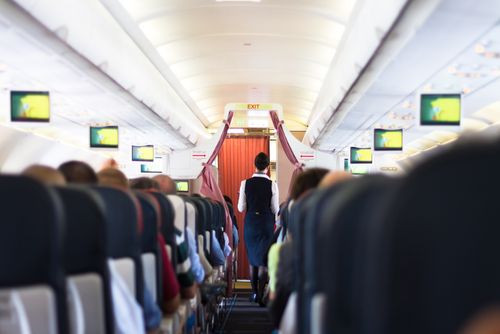Obesity Caused By Jet Lag? The Toll Planes Take On Gut Health

Leaving on a jet plane? More like gut plane. Frequent travel disrupts circadian rhythms, or the body’s internal clock, and it negatively impacts gut health, according to a new study published in the journal Cell. While it’s not the first time an off-balance body clock has been linked to increased risk for disease, such as obesity, cancer, and diabetes, it is the first time a study has considered the role gut microbes play.
After researchers analyzed microbes in fecal samples from mice and humans collected at differet times of the day, they found "rhythmic fluctuations in the abundance of microbes and their biological activities." These fluctuations were a result of the hosts' (mouse or human) body clock and regular diet. When researchers subjected mice to a light-dark schedule, as well as subjected them to abnormal eating habits for 24 hours, a mouse's microbes stopped fluctuating and changed in composition completely. A similar change occured in jet-lagged humans who traveled from the United States to Israel, which apparently encouraged the growth of bacteria linked to obesity and metabolic disease.
"Our findings highlight a new therapeutic target that may be exploited in future studies to normalize the microbiota in those people whose lifestyle involves frequent alterations in sleep patterns, such as shift workers and very frequent fliers," said Eran Elinav, lead study author from the Weizmann Institute of Science, in a press release. "Targeting the harmful changes in the microbiota in these large human populations with probiotic or antimicrobial therapies may reduce or even prevent their risk of developing obesity and its complications."
Gut bacteria... So hot right now. The healthier it is, science finds, the more positive it impacts a person's body. Some research has shown healthy gut bacteria helps bodies to metabolize and maximize prescription medications, while other research finds a healthy gut benefits heart health. This actually makes a lot of sense when you consider the fact the human gut contains 10 times more bacteria than the number of cells in the body. Eating a lot of fiber and fermented foods, like kefir, yogurt, and kimchi, can regulate this bacteria.
As far as jet leg, we're not about to tell you to cancel your European or Middle Eastern vacation. We are going to tell you to be more mindful of your travel habits, specifically waking up and going to sleep when you're supposed to. Staying up too late throws your body's clock off, and it's harder to discern when you are or aren't supposed to be awake.
To make it easy, reasearchers at the University of Michigan have, of course, made an app for that. It's called Entrain — named after "entrainment," the scientific term for synchronizing circadian rhythm — and it relies on natural light as the strongest regulator of our inner clocks. You can learn more about it here.
Source: Elinav E, et al. Trans-kingdom control of microbiota diurnal oscillations promotes metabolic homeostasis. Cell. 2014.



























